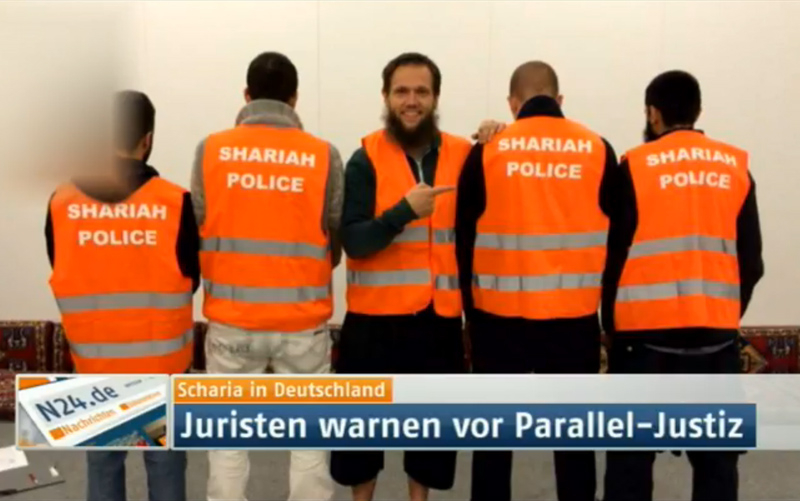May 1. The anti-immigration Alternative for Germany (AfD), now the third-most popular political party in Germany, adopted a manifesto calling for curbs to migration and restrictions on Islam. The document calls for a ban on minarets, Muslim calls to prayer and full-face veils.
May 2. Hans-Georg Maaßen, the head of Germany’s domestic intelligence agency, revealed that around 90 “predominately Arabic-speaking” mosques in Germany are under surveillance. He said they involve mostly “backyard mosques” where “self-proclaimed imams and self-proclaimed emirs” are “inciting their followers to jihad.” He called on moderate Muslims to work with the government to fight extremism and defend the constitutional order. Maaßen was speaking ahead of a security conference in Berlin at which he said that his agency we receiving on average four terror alerts every day: “The Islamic State is committed to attacking Germany and German interests.”
May 2. During an investigation into the mass sexual assaults in Cologne on New Year’s Eve, a chief superintendent from the Cologne police department revealed that he was ordered to remove the term “rape” from an internal police report about the assaults. The superintendent, identified only as Jürgen H., said that he received a telephone call on January 1 from an official at the interior ministry in North-Rhine Westphalia, who told him in an angry tone: “This is not rape. Remove this term from your report. Submit a new report.” The revelation adds to suspicions that there was a political cover-up to avoid fueling anti-immigration sentiments.
May 3. A 20-year-old migrant from Afghanistan sexually assaulted a six-year-old boy in the changing room of a sports hall in Munich. Police said the same migrant had sexually assaulted an 11-year-old girl at a public swimming pool in 2013.
May 3. A high court in Düsseldorf ruled that a group of eight German Islamists who dressed up in orange vests with the words “SHARIA POLICE” and who attempted to enforce Islamic law on the streets of Wuppertal in 2014 would face trial. The ruling overturned a lower court decision in December 2015 that the men would not face trial. The upper court said that the men had violated a law banning the wearing of uniforms at public rallies. The law, which prohibits uniforms that express common political views, was originally designed to ban neo-Nazi groups from parading in public. If convicted, the Islamists face up to two years in prison.

A high court in Düsseldorf, Germany ruled that a group of eight Islamists who dressed up in orange vests with the words “SHARIA POLICE” and who attempted to enforce Islamic law on the streets of Wuppertal in 2014 would face trial. They are charged under a law that prohibits the wearing of uniforms at public rallies — a law originally designed to ban neo-Nazi groups from parading in public. |
May 5. A new INSA poll found that 60% of the Germans surveyed believe that Islam does not belong to Germany. By contrast, only 22% said they believe Islam is an integral part of German society. Nearly half (46%) of those surveyed said they are worried about the “Islamization” of Germany. In a similar poll conducted in January 2015, 37% of respondents said Islam belongs to Germany, 15% more than now. The results indicate that German attitudes toward Islam are changing after the decision by Chancellor Angela Merkel to allow more than 1.1 million mostly Muslim migrants to enter the country in 2015.
May 6. A YouGov poll found that 62% of the Germans surveyed do not have any Muslims among their close personal friends. Around 60% of those surveyed also said that in their daily life they had noticed an increased number of Muslims in the country. German multiculturalists blamed Germans for their lack of openness to diversity. Others said the poll proved that Muslims in Germany are isolating themselves from the larger society.
May 7. A gourmet hamburger restaurant in Cologne closed after receiving threats over its “Erdogan Burger.” In April, Jörg Tiemann, the manager of “Urban Burgery,” added to his menu a burger with goat cheese and named it the Erdogan Burger. He was responding to Turkish President Recep Tayyip Erdogan’s effort to prosecute the German comedian Jan Böhmermann for a poem mocking the Turkish leader. In a Facebook post, Tiemann wrote:
“Urban Burgery is forced to close until further notice. Because of concrete threats, we can no longer guarantee the safety of our employees. But one thing is certain: We will not be muzzled by the enemies of democracy, rule of law and civil liberties.”
May 9. Frank-Jürgen Weise, the director of Federal Office for Migration and Refugees (Bundesamt für Migration und Flüchtlinge, BAMF), said that his agency will process more than one million asylum requests in 2016. This number includes 430,000 applications from 2015 that are currently being processed; another 300,000 applications from migrants who arrived in Germany in 2015 but have not yet filed claims; and 500,000 applications from migrants who will arrive in Germany in 2016.
May 9. The German branch of Open Doors, a non-governmental organization supporting persecuted Christians, reported that thousands of Christians in German refugee shelters are being persecuted by Muslims, sometimes even by their security guards. The report, which asserts that in most cases German authorities have done nothing to protect the victims, alleges that German authorities and police have deliberately downplayed and even covered up the “taboo issue” of Muslim attacks on Christian refugees, apparently to avoid fueling anti-immigration sentiments.
May 10. A German man shouting “Allahu Akbar” (“Allah is the Greatest”) and “infidels must die” stabbed one person to death and slashed three others in an early morning attack at a train station near Munich. Police said the suspect, a 27-year-old unemployed carpenter identified only as Paul H., was mentally ill and did not appear to have any ties to Islamist groups.
May 11. The Federal Police (Bundeskriminalamt, BKA) revealed that federal and state authorities are investigating 40 cases in which Islamic militants entered Germany while posing as refugees. “German security officials have indications that members and supporters of terrorist organizations are being smuggled in with refugees in a targeted, organized way in order to launch attacks in Germany,” according to a BKA spokeswoman.
May 11. The first Muslim woman was elected as speaker of the state parliament in Baden-Württemberg. Muhterem Aras, 50, was born in Turkey and moved to Stuttgart at the age of 12. She is a tax accountant and financial affairs spokeswoman for the Green party. Her election has been widely hailed as a Muslim integration success story. “We wrote history today,” Aras said, adding that Baden-Württemberg had sent “a message of openness, tolerance, and successful integration.” Aras has been a proponent of allowing migrants without German citizenship to vote in local elections.
May 12. In an interview with Deutsche Welle, Germany’s most prominent feminist, Alice Schwarzer, talked about her new book on the sexual assaults in Cologne on December 31. She said that although more than 600 women have filed complaints, she does not expect any of the perpetrators to be convicted:
“For one, because of the method they used: from a huge group of over a thousand men, small groups split off, surrounded and mistreated the women, only to disappear in the large mass again. It was difficult for the victims to identify the perpetrators. Also, what is trivialized as ‘sexual harassment’ in German penal law isn’t punishable to this very day.”
May 12. Protestant, Catholic and Orthodox leaders issued a joint statement calling on Christians in Germany to welcome Muslim migrants with “openness, with the spirit of charity.” The letter — which does not distinguish between legitimate asylum seekers and hundreds of thousands of economic migrants posing as refugees — said:
“The right to asylum, which is laid down in the Basic Law, and the obligations arising from the Geneva Convention, requires our country to grant anyone who seeks refuge with us access to an individual, fair and impartial procedure, regardless of how many people are currently in need of protection and irrespective of the country of origin.
…
“Refugees are people with individual stories; they expose us to new experiences, hopes and ideas. We are convinced: The more people we meet, the less space remains for prejudice, hatred and rejection.”
May 14. The newsmagazine Der Spiegel reported the contents of a leaked document from the Finance Ministry which revealed that the migrant crisis would end up costing German taxpayers €93.6 billion ($105 billion) between now and 2020. About €25.7 billion would be for social spending, especially unemployment benefits and housing support. About €5.7 billion would be destined for language courses and €4.6 billion for integrating refugees into the workforce.
May 15. Nearly a dozen women between the ages of 16 and 48 reported being sexually assaulted by groups of male migrants at a music festival in the Kreuzberg district of Berlin. The attacks at the Carnival of Cultures, where groups of men encircled the women and assaulted and robbed them, were similar to those in Cologne on New Year’s Eve.
May 16. In an interview with Die Welt, Beatrix von Storch, the deputy leader of the anti-immigration Alternative for Germany (AfD) party, called on Germany’s main Islamic associations to “explicitly distance” themselves from Islamic sharia law, something they so far refused to do. She said the AfD had nothing against individual Muslims, but it opposed political Islam, which she said contradicts the German constitution.
May 17. A court in Hamburg ruled that the author of a poem lampooning Turkish President Recep Tayyip Erdogan was prohibited from publicly reciting passages of his work. The court said that comedian Jan Böhmermann was allowed to recite only six of the 24 lines of his poem, thereby handing Erdogan a legal victory in a case that prompted a debate in Germany over freedom of speech. Chancellor Angela Merkel personally authorized criminal proceedings against the comic. She was accused of pandering to Erdogan’s autocratic government.
May 18. The Berliner Morgenpost reported that a Turkish-born Salafist had been given access to the secure areas of both of the Tegel and Schönefeld airports in Berlin for nearly a year after authorities discovered his ties to fundamentalist Islam. The 24-year-old man, identified only as Recep Ü., was fired after he attempted to smuggle brass knuckles into the secure area of the Schönefeld airport. Wisag Airport Service Berlin, the company that directly hired the man, said that neither German police nor German intelligence had passed on information that the man was an active member of Germany’s Salafist scene.
May 18. The Berliner Morgenpost reported that large groups of male migrants have been gathering at the Boulevard Berlin shopping mall in the Steglitz district of the capital, where they have been sexually assaulting female passersby. At least 35 teenage migrants have been loitering at the mall for several weeks, in part because there is free access to the Internet. When security guards asked them to leave the premises, the youths called for back-up and soon dozens more teenage migrants arrived to taunt and harass the guards, who were required to use pepper spray to defend themselves.
May 22. A doctor in Cologne is being sued for discrimination after he declined to treat a Muslim woman who refused to shake his hand. The woman said she could not shake the doctor’s hand on religious grounds, but the doctor noted that the Koran does not prohibit handshakes. After the woman became confrontational, the doctor declined to treat her on the grounds that there was no basis of trust between doctor and patient. The woman’s husband is now suing the doctor for religious discrimination. The doctor faces a fine of €2,000 ($2,250).
May 23. A 23-year-old asylum seeker from Iraq who was wearing a T-shirt saying “I’m Muslim Don’t Panic” was assaulted by fellow refugees for offending Islam. After ripping his T-shirt to shreds, a 27-year-old Syrian and a 33-year-old Lebanese beat the man so badly that he was hospitalized. The two men were arrested and charged with causing grievous bodily harm.
May 23. Bavarian Interior Minister Joachim Herrmann announced a new plan to recruit migrants to the police force regardless of whether they have acquired German citizenship. He said he hoped the initiative would create a “more direct line” to people with an immigrant background by hiring those who speak their language and understand their mentality. Herrmann said the plan was motivated not by the threat of Islamic terrorism, but by a series of xenophobic murders committed between 2000 and 2007 by a now defunct neo-Nazi group called the National Socialist Underground (Nationalsozialistischer Untergrund, NSU).
May 24. Police arrested a 26-year-old migrant from Pakistan suspected of murdering a 70-year-old woman in her home near Heilbronn. The man, who was living in an asylum shelter in Öhringen, had left documents in Arabic and English “of an overwhelmingly religious nature” at the scene of the crime.
May 25. Germany’s coalition government agreed on a new “Integration Law” aimed at regulating the rights and responsibilities of asylum seekers in Germany. The main focus of the law is to encourage refugees to learn enough German to be able to find a job and help pay for their living expenses. Critics say the new law is a largely symbolic measure directed at reassuring German voters and blunting the rise of the anti-immigration Alternative for Germany party. They say the new law is inadequate to deal with Germany’s integration problems, in part because it applies only to legitimate asylum seekers, not to the hundreds of thousands of economic migrants who have entered Germany illegally by posing as asylum seekers.
May 25. A 19-year-old migrant from Iraq was sentenced to two years in prison for raping a 21-year-old woman at the train station in Bad Schwartau, a town in northern Germany. The man —who admitted to dragging the woman into the men’s restroom and raping her — received the minimum possible sentence according to Section 177 of Germany’s criminal code.
May 26. A 26-year-old migrant from Afghanistan was sentenced to two-and-a-half years in prison for raping a woman who had offered him accommodation in her home in Cologne. The woman had offered the room by means of a website called “Refugees Welcome” (Flüchtlinge Willkommen), which “supports decentralized housing solutions for refugees.” According to the website: “Through our work, we aspire to contribute to nurturing an open society based on principles of solidarity and equality of all. One of our core principles as an organization is that no one is illegal.”
May 26. The newsmagazine Focus reported that increasing numbers of Germans are relocating to Hungary because of Chancellor Angela Merkel’s open door migration policy. A real estate agent in a town near Lake Balaton, a popular tourist destination in western Hungary, said that eight out of ten Germans who want to relocate there cite Germany’s migration crisis as the reason for their desire to leave the country.
May 27. The head of the Protestant Church in Germany, Heinrich Bedford-Strohm, called for Islam to be taught in all German public schools as a way to distance young Muslims from radical ideologies. In an interview with the Heilbronner Stimme, Bedford-Strohm said that teaching Islam in schools nationwide would give Muslim students the opportunity to take a critical approach to their own religion: “Tolerance, freedom of religion and freedom of conscience should apply to all religions. These principles can be best taught if religion is part of the state’s educational mission.” Bedford-Strohm said German Islamic associations — many of which have ties to foreign governments, including Turkey and Saudi Arabia — should be responsible for developing and teaching these courses.
May 27. A Protestant church in Hamburg held a funeral service for a convert to Islam who was killed fighting for the Islamic State in Syria. The controversial funeral at the St. Pauli church was for a teenager named Florent, who was born in Cameroon and raised as a Christian in Hamburg. When he was 14, Florent converted to Islam and changed his name to Bilal. He quickly became radicalized and joined the German Salafist movement. He left for Syria on a false passport in May 2015 and was killed three months later. Pastor Sieghard Wilm, who organized the “interfaith” funeral, was criticized for “idealizing” the life of the terrorist. He responded by saying that the church should be a “place of learning for the respect of other religions.”
May 29. Green party politician Stefanie von Berg called for new mosques to be built in every district of Hamburg so that the city’s burgeoning Muslim population has enough space to pray. She said the construction of visible new mosques is essential for integrating the Muslim community. The Heinrich Böll Foundation, a think tank linked to the Green party, estimates that there are more than 150,000 Muslims in Hamburg, the second-largest city in Germany, but less than 50 mosques.
May 31. Groups of male migrants sexually assaulted at least 18 women at an outdoor festival in Darmstadt. The attacks at the Schlossgrabenfest, in which large numbers of men surrounded women and sexually assault them, were similar to those that occurred in Cologne on New Year’s Eve and the Carnival of Cultures in Berlin on May 15. The phenomenon whereby women are encircled by groups of men and sexually harassed, assaulted, groped and raped is known in Arabic as “taharrush” (al-taharrush al-jinsi, Arabic for “sexual harassment”).
May 31. In an interview with the Frankfurter Allgemeine Zeitung, the Dalai Lama said that Germany has accepted “too many” migrants and that they should eventually be returned to help rebuild their home countries. “Germany cannot become an Arab country,” he said. “Germany is Germany.”
Soeren Kern is a Senior Fellow at the New York-based Gatestone Institute. He is also Senior Fellow for European Politics at the Madrid-based Grupo de Estudios Estratégicos / Strategic Studies Group. Follow him on Facebook and on Twitter. His first book, Global Fire, will be out in 2016.
































